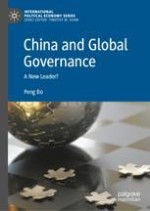2021 | OriginalPaper | Chapter
2. The Concept of ‘International Leadership with Chinese Characteristics’
Author : Peng Bo
Published in: China and Global Governance
Publisher: Springer International Publishing
Activate our intelligent search to find suitable subject content or patents.
Select sections of text to find matching patents with Artificial Intelligence. powered by
Select sections of text to find additional relevant content using AI-assisted search. powered by
